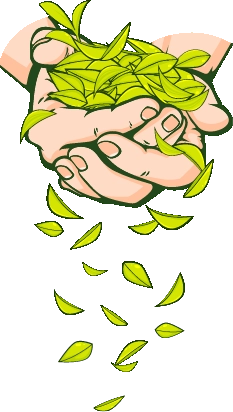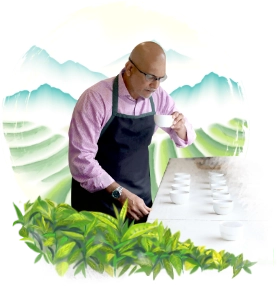Tea in English Literature
Ever since it was first introduced in the 17th century, tea has captivated and fascinated the literary world. From Pepys to Proust and from Mary Poppins to Mad Hatter, tea has regularly featured as a backdrop for some of the most memorable situations. This reflects how tea had become inextricably intertwined with everyday social and cultural aspects of life.
Here are some interesting and intriguing mentions of tea in English Literature:
The Diary of Samuel Pepys
The earliest mention of tea (written as tee then) occurs in an entry dated Tuesday 25 September 1660, in the now-famous The Diary of Samuel Pepys. The entry recorded is:
‘To the office, where Sir W. Batten, Colonel Slingsby, and I sat awhile, and Sir R. Ford coming to us about some business, we talked together of the interest of this kingdom to have a peace with Spain and a war with France and Holland; where Sir R. Ford talked like a man of great reason and experience. And afterwards I did send for a cup of tee (a China drink) of which I never had drank before, and went away.’
Lewis Carroll’s “Alice’s Adventures in Wonderland”
Arguably one of the most famous of all tea-parties is the immortal Mad Hatter’s tea party in Alice in Wonderland by Lewis Carroll. This utterly chaotic but immensely comical passage is scathig satire on the ritual of fashionable afternoon tea in Victorian Britain, where aristocratic ladies used to gossip frivolously. The Mad Hatter’s tea party has become iconic and assumed a cult-like status, as have its characters – the March Hare, the Dormouse and of course, the Mad Hatter! Here is a memorable piece from the perhaps the most famous tea party in the world :
Twinkle, twinkle, little bat!
How I wonder what you’re at!”
“Up above the world you fly,
Like a tea-tray in the sky.
Marcel Proust’s “ In Search of Lost Time”
That a cup of tea can trigger such powerful emotions and memories that it leads the author to write one of the most read autobiographies itself is a tribute to how tea has always had a special place in humanity! Indeed, In Search of Lost Time starts with the author dipping his madeline into a cup of tea that magically transports him to the earliest days of his childhood. So powerful and deep were these memories, that they featured both in the entire series of books by Proust. Not just the beginning, but also the end of the book featured tea!
Here is the opening of the book:
“No sooner had the warm liquid mixed with the crumbs touched my palate than a shudder ran through me and I stopped, intent upon the extraordinary thing that was happening to me…The sight of the little madeleine had recalled nothing to my mind before I tasted it. And all from my cup of tea.”
Charles Dickens “The Pickwick Papers”
Tea drinking appears in numerous works of Charles Dickens. But in most situations, it is only forms a mere backdrop of the scene, reflecting the times during which the novels were written – when tea drinking had become such an integral part of life that it was taken for granted. In Pickwick Papers, his first novel, there are many instances of tea drinking and the tea drinking culture. For example, it is in this novel that Dickens writes
“Water is the mother of tea, and the pot is the father of tea.”
Various types of tea-pots are also mentioned in the novel : from the ‘pure silver teapot’ to the ‘British metal teapot’ to the ‘Chinese porcelain teapot. The typical British way of tea drinking – adding lots of milk and sugar, is also described vividly in the novel :
“pure silver teapot, butter jar and sugar plate”
Henry James “ The Portrait of a Lady”
Amongst the most memorable opening lines in English literature is the tribute to Afternoon Tea by Henry James in The Portrait of a Lady. This is how he begins the novel:
“Under certain circumstances, there are few hours in life more agreeable than the hour dedicated to the ceremony known as afternoon tea.”
He further goes on to add that:
“…whether you partake of tea or not … the situation is in itself delightful.”
Oscar Wilde “The Importance of Being Earnest”
Wilde’s wild and biting wit is brilliantly showcased in the opening scene of this ‘trivial comedy for serious people’! As the act draws to a close with Algy and Jack having been caught in their farcical pretence and are fuming with rage and embarrassment, Algy cuts a comical figure when he declares :
“I haven’t quite finished my tea yet! And there is still one muffin left.”
P.L.Travers “Mary Poppins”
In the alluring and magical world of Mary Poppins, there is once a tea party on a ceiling. The fantastically famous tea party is at the home of Mary’s uncle, Mr. Wigg, who is celebrating his birthday, and gives very clear and specific instructions on how the tea is to be served :
“ It is usual,I think, to begin with bread and butter. But as it is my birthday, we will begin the wrong way – which I always think is the right way – with the cake!”
And he cuts a large slice for everybody.
There are many, many more books, plays and movies where memorable scenes and situations around tea drinking are depicted. Do share with me your favourite ones!

Tea is a religion in the art of life.

